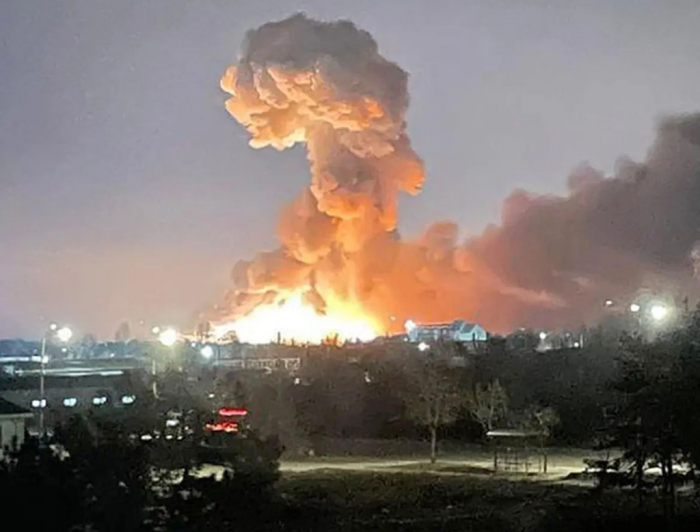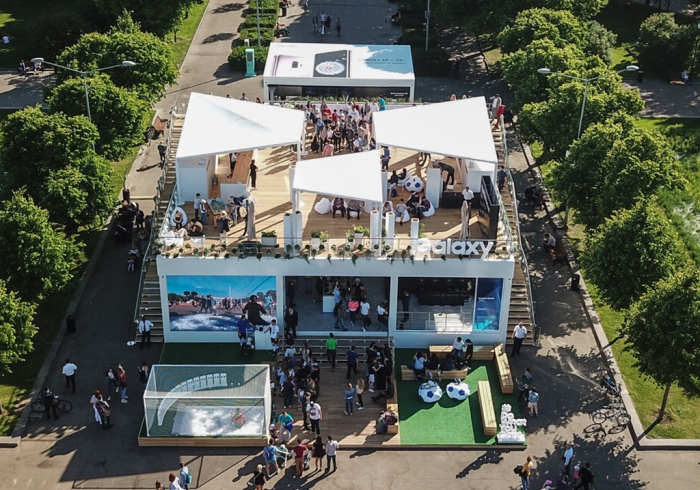War in Ukraine
Perfect storm from Ukraine crisis clouds Korea Inc.’s outlook
US sanctions will hurt chips, smartphone exports; auto parts sales are expected to tumble
By Feb 25, 2022 (Gmt+09:00)
4
Min read
Most Read
LG Chem to sell water filter business to Glenwood PE for $692 million


Kyobo Life poised to buy Japan’s SBI Group-owned savings bank


KT&G eyes overseas M&A after rejecting activist fund's offer


StockX in merger talks with Naver’s online reseller Kream


Mirae Asset to be named Korea Post’s core real estate fund operator



South Korean companies had dreamed of a post-COVID-19 earnings recovery as the globe geared up for economic reopening. But their hopes are now dampened by Russia's military attack on Ukraine.
The crisis has raised global commodity prices and disrupted the global supply chain, adding risks to Asia’s fourth-largest economy already coping with issues such as rising inflation, increasing interest rates and a weakening won currency.
South Korea’s 97 listed companies are expected to report a combined 44.8 trillion won ($37.3 billion) in operating profit during the first quarter, according to financial information provider FnGuide Inc on Friday. This is 0.8% lower than a consensus of 45.2 trillion won forecast a month earlier. The operating profit margin forecast fell to 12.8% from 13.9% during the period.
“Once Russia’s invasion of Ukraine is reflected, the operating profit consensus is expected to decline further,” said an investment industry source.
Major companies rushed for revising business plans for this year, which had been established late last year with a positive outlook, according to a business circle source.
SANCTIONS TO HIT EXPORTS, OPERATIONS IN RUSSIA
The US and the European Union imposed comprehensive economic sanctions against Russia, including bans on exports of high-tech products to the country -- expected to hurt South Korean companies’ overseas sales of key products such as semiconductors. The punitive measures are also likely to disrupt the operations of factories in Russia. In addition, weaker demand amid the slowing global economy and volatility of the Russian rouble currency is predicted to erode their earnings.
South Korean companies are closely watching whether the crisis, especially if it lasts long, will destruct the global supply chain. Russia is a major producer of crude oil and natural gas, as well as a key supplier of raw materials such as nickel, copper and aluminum. Oil prices topped $100 a barrel immediately after Russia launched the invasion, while other commodity prices also surged.
“Russia is not a big trading partner, accounting for 1.6% of South Korea’s total exports, but if raw material prices keep rising due to the prolonged crisis, the overall industries will inevitably suffer from a chain shock,” said the Korea International Trade Association.
Major South Korean companies such as Samsung Electronics Co. and Hyundai Motor Co. are keeping an eye on the impact of sanctions against Russia on their exports and production in the country. Battery makers including LG Energy Solution Inc. are concerned about the potential disruption of raw material supplies.
SEMICONDUCTORS, SMARTPHONES
The US Commerce Department on Thursday announced sanctions against Russia, including prohibitions of sales of high-tech products such as chips, computers and telecommunications equipment to Russia. The controls rely on a dramatic expansion of the Foreign Direct Product Rule, forcing companies making items overseas with US tools to seek a license from the US before shipping to Russia.
Semiconductor production usually needs US basic design technology, which means semiconductors produced by Samsung and SK Hynix Inc. are subject to the measures.
“The sanctions will cut exports of semiconductors to be used for Russia’s smartphones, laptops and data centers,” said an industry source in South Korea.
Smartphone exports are also predicted to slide since the communication devices need mobile application processors that use US design technology. Samsung is the No. 1 player in the Russian smartphone market with a 30% share last year.

AUTOMOBILES, BATTERIES
Auto parts exports are likely to become another victim, hurting Hyundai’s car production in Russia. About 90% of exports of auto components to Russia are shipped to plants operated by Hyundai and its affiliate Kia Corp., according to the Korea Automobile Manufacturers Association (KAMA).
“Russia is a big market to local auto parts makers,” said a KAMA official. “The auto parts industry will be inevitably hit hard, while automakers will be able to sell products to other markets.”
Surging prices of raw materials for secondary batteries are also worrisome since Russia is the world’s second-largest producer of aluminum, a key ingredient of cathode materials, and the No. 3 producer of nickel. Russia makes up 10% of the global production of those raw materials.
Aluminum prices stood at $3,445 per ton as of Thursday, up 33% from $2,590 in December 2021, while nickel prices surged 34.7% to $26,105 a ton during the period.
Write to Kyung-Min Kang, Il-Gue Kim and Yun-Sang Ko at kkm1026@hankyung.com
Jongwoo Cheon edited this article.
More to Read
-
 War in UkraineKorean firms on high alert as Russia invades Ukraine
War in UkraineKorean firms on high alert as Russia invades UkraineFeb 24, 2022 (Gmt+09:00)
3 Min read -
 EconomyBOK sees inflation at 11-year high as oil tops $100 on Ukraine crisis
EconomyBOK sees inflation at 11-year high as oil tops $100 on Ukraine crisisFeb 24, 2022 (Gmt+09:00)
3 Min read
Comment 0
LOG IN


